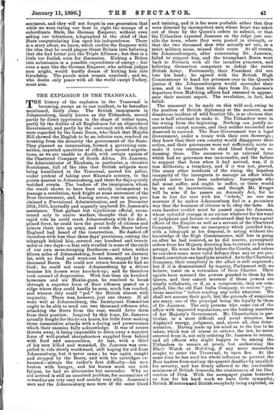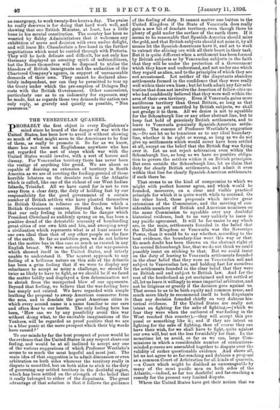THE EXPLOSION IN THE TRANSVAAL. T HE history of the explosion
in the Transvaal is becoming, except as to one incident, to be hereafter mentioned, fairly clear. The British immigrants in Johannesburg, locally known as the Uitlanders, moved partly by direct oppression in the shape of unfair taxes, partly by the dislike of all Englishmen for an oligarchical Government, and partly by the contempt with which they were regarded by the lower Boers, who think that Majuba Hill showed the English to be an inferior race, resolved on wresting from the minority the government of the State. They planned an insurrection, formed a governing com- mittee, imported quantities of rifles, and opened negotia- tions, as we are unable to doubt, with certain agents of the Chartered Company of South Africa. Dr. Jamieson, the Administrator of Rhodesia, in particular, a chivalric Scotchman, full of the idea that British subjects were being humiliated in the Transvaal, moved his police, under pretext of taking over Khama's country, to the points nearest to Johannesburg, and there for days quietly watched events. The leaders of the immigrants, whom the result shows to have been utterly incompetent to manage a revolution, took fright at some movement of the Boer Government, and, fearing arrest, rose in arms, pro- claimed a Provisional Administration, and on December 28th, 1895, hurriedly and urgently implored Dr. Jameson's assistance. That gallant but injudicious official, accus- tomed only to native warfare, thought that if by a rapid ride he could reach Johannesburg with his disci- plined force, he could turn the great body of citizens and miners there into an army, and crush the Boers before England had heard of the insurrection. He dashed off therefore with less than three days' provisions, cutting the telegraph behind him, covered one hundred and twenty miles in two days—a feat only rivalled in some of the raids of our own moss-trooping Borderers—and when within fifteen miles of Johannesburg, found himself on January 1st, with no food and worn-out horses, stopped by two thousand Boers. He could not return because he had no food ; he could not reach Johannesburg by a detour because his horses were knocked-up; and he therefore took counsel of desperation. With less than six hundred horsemen and six Maxim-guns, be resolved to break through a superior force of Boer riflemen posted on a ridge where they could hardly be seen, much less reached, and whence they could "pot" the British almost with impunity. There was, however, just one chance. If all went well at Johannesburg, the Immigrant Committee ought to be able to send out two thousand riflemen who, attacking the Boers from the rear, would drive them from their position. Inspired by this hope, Dr. Jameson actually fought for thirty-six hours, his little force making three consecutive attacks with a daring and perseverance which their enemies fully acknowledge. It was of course thrown away, it being impossible to drive away a superior force of well-posted sharpshooters supplied from behind with food and ammunition. At last, with a third of his men killed and wounded, Dr. Jameson was com- pelled to ride slowly southward, still hoping for aid from Johannesburg, but it never came ; he was again caught and stopped by the Boers, and with his cartridges ex- hausted—always the raider's first difficulty—his men broken with hunger, and his horses worn out with fatigue, he had no alternative but surrender. Why no aid arrived is still an unsolved problem, for accusations of ecwardice are very easy and usually very silly. Jamesou's men and the Johannesburg men were of the same blood and training, and it is far more probable either that they were directed by incompetent men whose heart was taken out of them by the Queen's orders to submit, or that the Uitlanders expected Jameson on the ridge just out- side the town, where they were posted in strength, or that the two thousand men who actually set out, in a strict military sense, missed their route. At all events, the Johannesburgers, after summoning Dr. Jameson, failed to support him, and the triumphant Boers went back to Pretoria with all the invaders prisoners, and believing themselves competent to defeat the entire British Army. Fortunately, their President did not lose his head ; he agreed with the British High Commissioner to hand his prisoners over to the Queen's justice if the Johannesburgers would surrender their arms, and in less than nine days from Dr. Jameson's departure from Mafeking, affairs had resumed in appear- ance their ancient aspect. The revolution, in fact, had failed.
The comment to be made on this wild and, owing to the position of British diplomacy at the moment, most disastrous incident of wild frontier life, is so obvious that one is half reluctant to make it. The Uitlanders were in the wrong from the beginning. Nothing can justify in- surrection except success, and they neither succeeded nor deserved to succeed. The Boer Government was a legal Government, under a treaty with their own Sovereign ; they knew that their own country would disapprove their action, and their grievances were not sufficiently acute to make it even reasonable to shed blood freely in re- dressing them. The summons to an external force which had no grievance was inexcusable, and the failure to support that force when it had arrived, was, if it was deliberate, a treachery, and if it was not, proved, like many other incidents of the rising, the hopeless incapacity of the insurgents to manage an affair which should never have been undertaken. Insurgents who fail must suffer, and ought to suffer, or there would be no end to insurrections, and though Mr. Kruger will be wise if he passes an Amnesty Act, for he has to live for ever with his "rebels," no one can murmur if be makes Johannesburg feel in a pecuniary way that the business of citizens is to obey the laws. An even harsher verdict must be passed upon Dr. Jameson, whose splendid courage is no excuse whatever for his want of judgment and failure to understand that he was a great officer of the Empire as well as a servant of the Chartered Company. There was no emergency which justified him, with a telegraph at his disposal, in acting without the knowledge of the High Commissioner, still less in going on after he had received, as be did receive, peremptory orders from her Majesty directing him to return to his own satrapy. He must be brought before the Courts, and unless he can show some more valid defence than any as yet pro- duced, conviction can hardly,be avoided. As to the Chartered Company, their complicity in the affair is still unproved ; but if it is demonstrated by inquiry, Parliament will, we believe, insist on a revocation of their Charter. Their agents have misused the powers granted to them by the Queen, and they cannot murmur if those powers are totally withdrawn, or if, as a compromise, they are com- pelled, like the old East India Company, to receive " pre- vious sanction " before sending any order whatever. We shall not assume their guilt, but the grounds of suspicion are many, one of the principal being the loyalty to them of Dr. Jameson. The only persons who come out of the affair with improved reputations, are the leading members of her Majesty's Government. Mr. Chamberlain in par- ticular, in a most difficult and novel situation, has displayed energy, judgment, and, above all, clear deter- mination. Having made up his mind as to the line to be taken, which was of course to enforce the law, he never swerved from it, not only ordering Dr. Jameson to return, and all officers who might happen to be among the Uitlanders to remain at peace, but authorising the Black Watch at Mafeking, if any more marauders sought to enter the Transvaal, to open fire. At the same time he has used his whole influence to prevent the Boer leaders from making the quarrel deadlier by uncalled- for severity, and has firmly adhered to the irreducible minimum of British demands, the continuance of the Con vention of 1864. With the newspaper praise bestowed on him for his hard work we have little sympathy, British Ministers and British everybody being expected, on



































 Previous page
Previous page